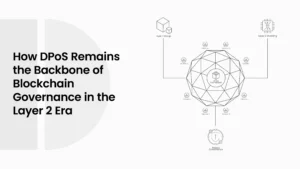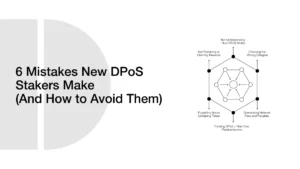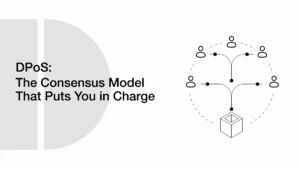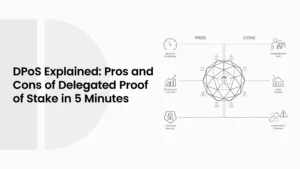Can Social Reputation Fix Delegate Elections in DPoS Blockchains?
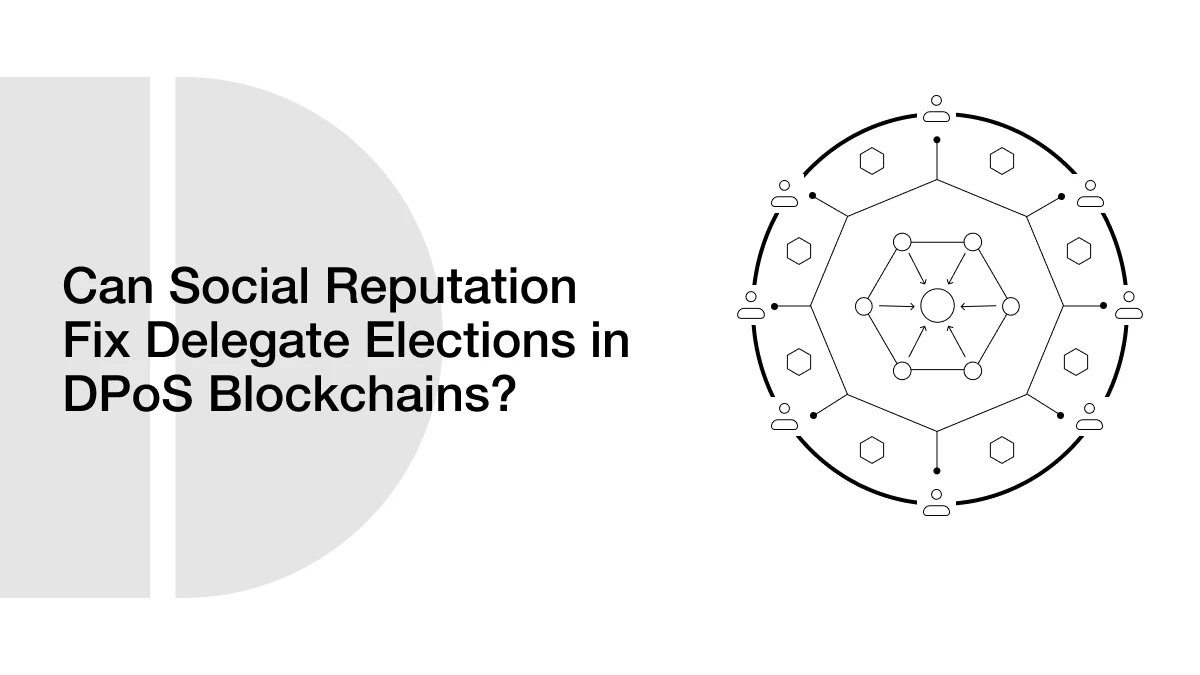
Blockchain is known as a “trustless” system. That means people don’t need to trust each other or a central authority to keep things fair. Instead, the technology itself uses code, math, and open records to make sure everything runs the right way. But even in a trustless system, trust still plays an important role, especially when people have to vote for who gets to lead. In a blockchain model called Delegated Proof of Stake (DPoS), not everyone helps create new blocks. Instead, users vote to pick a small group of trusted people, called “delegates” or “witnesses.” These delegates confirm transactions, add blocks to the chain, and help the network stay fast and secure.
- What Are Social Reputation Systems?
- How DPoS Works
- The Need for Reputation in DPoS Voting
- The Problem with Popularity-Based Voting
- Why Delegates Should Earn Their Position
- Centralization Risks Without Accountability
- How Social Reputation Systems Can Help
- How Reputation is Calculated in DPoS
- Real-World Application: A Smarter Election System
- Virtual Stake + Social Reputation
- Voting Beyond Just Support
- Benefits of Using Reputation in DPoS Delegate Elections
- Challenges in Implementing Reputation Systems
- What the Future Looks Like for DPoS Elections
- The Final Word
- Frequently Asked Questions (FAQs)
- Glossary of Key Terms
The idea is simple: you pick someone to speak and act on your behalf. But what if you don’t know how reliable they are? What if you’re just voting for someone popular, not someone qualified? That’s where problems can start, like missed blocks, network slowdowns, or even bad actors gaining too much power. This is why social reputation systems matter. They track how each delegate has behaved in the past, like how often they showed up to work (produced blocks), whether they voted fairly, and how involved they were in the community. With this information, voters can make smarter choices based on performance, not just popularity.
Trust is still important, even on a trustless system. And in DPoS, adding a social reputation layer helps make that trust measurable, visible, and useful (Mišić, Mišić, & Chang, 2023). This article explores how social reputation systems can make DPoS delegate elections fairer, safer, and more transparent.
What Are Social Reputation Systems?
A social reputation system is a tool that helps people decide who they can trust based on past behavior. You’ve probably used one without even thinking about it. For example, when you order food from a new restaurant on Uber Eats or choose a driver on Lyft, you’re looking at ratings and reviews. That’s a reputation system in action.
These systems collect feedback and performance data to give each person or service a score. The higher the score, the more trustworthy or reliable that person seems to be. It’s a simple idea but a powerful one. Reputation systems help people make better decisions when they don’t know the person directly.
This idea can be applied to the enhancement of elections in blockchain, particularly in Delegated Proof of Stake (DPoS) networks. Currently, the DPoS voters tend to elect the delegates depending on popularity or community hype. However, a social reputation system would allow them to view actual data, such as the activity of a delegate, the number of blocks confirmed, or whether they acted according to voting rules.
In short, a social reputation system brings more transparency to the blockchain. It doesn’t replace voting. It just gives voters better tools to choose the right people for the job (Chen & Liu, 2022). By applying this idea to blockchain elections, we can help communities pick better leaders, reward honest behavior, and discourage bad actors from gaining power.
How DPoS Works
Delegated Proof of Stake, or DPoS, is a type of blockchain system that works a lot like a small democracy. Instead of having everyone in the network vote on every single transaction, users vote for a few trusted people called delegates or witnesses who handle the heavy lifting. Think of it like electing city council members. You choose people to represent you. They review and approve new blocks of transactions. In return, they get rewards for doing their job well.
This system is faster and more energy-efficient than other types like Proof of Work (used by Bitcoin), because it limits the number of people who have to agree on each block.
DPoS has a few risks. One risk is centralization. If a few delegates keep winning over and over, power stays in the hands of a small group. Another problem is low voter participation; many users don’t vote at all. And sometimes, bad delegates who look good on the surface can sneak in and cause problems.
That’s why tools like social reputation systems are so important. They give voters more data and more confidence when deciding who to support. When used together, DPoS and reputation systems can make blockchain networks faster, fairer, and more secure (Larimer, 2014).
The Need for Reputation in DPoS Voting
The Delegated Proof of Stake (DPoS) has contributed to making blockchain networks more energy-efficient and faster. However, when there is no means of determining the best representatives, then the voting system can turn out to be faulty. It is for this reason that reputation is very crucial.
The Problem with Popularity-Based Voting
In many DPoS systems, voters choose delegates based on who’s popular, not who’s doing a good job. That’s like picking a team captain just because they’re loud, not because they’re skilled. Popularity doesn’t always mean trustworthiness.
Without solid information, voters can end up supporting people who:
- Skip block production
- Make dishonest decisions
- Don’t take part in network improvements
This kind of voting creates a weak system that’s easy to break. Once a bad actor becomes a delegate, they can do real damage before being voted out.
Why Delegates Should Earn Their Position
Delegates hold a lot of power in DPoS networks. They approve transactions, keep the chain running, and even vote on upgrades. So, shouldn’t they earn that position?
With a reputation system, each delegate’s past performance is tracked and scored. Voters can then choose people based on:
- How active they’ve been
- Whether they’ve followed the rules
- If they’ve contributed to community decisions
Centralization Risks Without Accountability
DPoS is supposed to be decentralized. But without accountability, the same group of delegates can get elected again and again, just because they’re well known. Over time, this leads to centralization, where a few people control everything.
Reputation systems fight this by making performance public. If a delegate isn’t doing their job, their score drops, and voters will notice. That helps spread power more evenly and keeps the network fair. Without a way to measure reputation, DPoS risks becoming just another popularity contest. With reputation tracking, it becomes a merit-based system that values results over noise.
How Social Reputation Systems Can Help
Social reputation systems bring structure and clarity to DPoS voting. These systems make the voters make better decisions by adding a performance-based score to each delegate, minimizing manipulation, and forming a stronger, more trustworthy blockchain network.
Transparency is one of the key benefits. Reputation systems monitor and display some measure of uptime, missed blocks, and community proposal participation. Making this information available to the general populace enables the electorate to view the entire history of a delegate. That way, it is not a name that people are voting on; it is performance. Such openness motivates the delegates to give their best because their activities are monitored and scored.
ALSO READ: How to Integrate Smart Contracts with DPoS-Based Blockchains
Besides transparency, reputation systems also allow voters to compare the candidates more easily. Let’s say there are 30 potential delegates. Without any background information, choosing who to vote for becomes a guessing game. But if each delegate has a reputation score and a performance summary, the choice becomes clearer and easier. This helps reduce voter confusion and promotes informed decision-making.
| Delegate Name | Uptime % | Missed Blocks | Governance Participation | Community Rating | Reputation Status |
| AliceNode | 99.8 | 1 | Active in 5 proposals | 4.9/5 | Excellent |
| BlockBob | 96.2 | 7 | No participation | 3.2/5 | Normal |
| SilentSam | 88.0 | 12 | Inactive | 2.1/5 | Selfish |
| EvilEd | 65.5 | 25 | Spammed 2 votes | 1.0/5 | Malicious |
This kind of scorecard makes the whole process more democratic. It also helps break up long-term power by exposing poor performance, no matter how popular a delegate might be.
Another benefit is that social reputation systems naturally discourage bad behavior. In case a delegate is lazy or dishonest, there score will reduce, and hence re-election will take place. Conversely, those delegates who respect the rules and remain active are rewarded with better scores and support. This makes reputation an in-built reward system that can make the blockchain remain healthy and safe.
Lastly, these systems encourage a more decentralized network. In DPoS, one of the biggest problems is power staying in the hands of a few. With transparent reputation scores, new and lesser-known candidates who perform well can earn support and get elected. That breaks the cycle of centralization and gives every hard-working participant a fair shot.
By making behavior visible, promoting fairness, and guiding voter decisions, social reputation systems are a natural upgrade to how we elect leaders in DPoS blockchains. They help voters shift from guessing and gambling to making data-driven, responsible choices.
How Reputation is Calculated in DPoS
In a Delegated Proof of Stake (DPoS) blockchain, reputation is more than just a label. It’s a calculated score based on a delegate’s behavior over time. This score helps voters understand who’s active, who’s trustworthy, and who might be a risk to the network.
Most reputation systems use a point-based model. Delegates start with a neutral score, and their actions either raise or lower that score. Good action, such as consistently producing blocks, participating in votes, and avoiding errors, boosts the score. Bad actions like missing turns, voting selfishly, or harming the network cause penalties. Over time, each delegate is placed into one of several reputation categories. These categories make it easier for voters to quickly evaluate who deserves their vote.
| Reputation Status | Behavior Type | Block Misses | Governance Votes | Community Impact |
| Excellent | Highly active and reliable | 0–2 | Consistent | Positive and trusted |
| Normal | Generally good performance | 3–10 | Infrequent | Neutral or unnoticed |
| Selfish | Votes only in self-interest | 5–15 | Selective | Risk of centralization |
| Malicious | Harming the network | 15+ | Harmful or absent | Negative or spammy |
In some advanced systems, the reputation score also decays over time if the delegate becomes inactive. This means a delegate can’t rest on their past success; they have to stay engaged to keep their score high. It keeps the playing field fair and encourages long-term participation (Mišić, Mišić, & Chang, 2023).
Some blockchains also include automated penalties, such as losing voting power or being excluded from the next election cycle if a delegate’s score drops below a certain threshold. This ensures that harmful behavior has real consequences, which strengthens the whole network.
Reputation calculation doesn’t have to be overly complex. Even simple scoring models can make a big difference in how voters choose their leaders. By showing each delegate’s track record in a transparent way, reputation systems add a much-needed layer of accountability in DPoS governance.
Real-World Application: A Smarter Election System
Using social reputation systems in DPoS isn’t just a theory; it’s a practical solution that can change how elections work. By combining reputation scores with voting tools like virtual stake, blockchain networks can move toward elections that are smarter, safer, and fairer.
In traditional DPoS, votes are based on the number of tokens a user holds. This can lead to problems, like rich users having too much power or voters choosing based on name recognition rather than behavior. But when you add reputation into the mix, the election system becomes more balanced.
Virtual Stake + Social Reputation
Virtual stake is a new concept that has been proposed to enhance the functionality of elections in the DPoS systems. The system does not just count the actual number of tokens that a person has, but it also considers behavior. To illustrate, a delegate with a high reputation score and a good track record would have greater virtual weight in the system, even when other delegates have more votes as a consequence. This makes elections more about trust and less about wealth.
Here’s how the combination might look:
- Actual stake: How many tokens support a delegate
- Virtual score: How well the delegate has performed
- Final election result: A mix of both values
This creates a more balanced system. Delegates can’t just buy votes; they have to earn them by behaving well over time.
Voting Beyond Just Support
Another powerful idea is negative voting. Most systems let voters show support, but not disapproval. What if voters could also vote against delegates who behave badly? That would help stop harmful actors early.
For example, if a delegate spams transactions or skips too many blocks, voters could cast a negative vote. This would lower the delegate’s score or even block them from running in the next round. That way, the system not only rewards good behavior but also punishes poor performance.
This approach creates a complete feedback loop. Good delegates rise. Bad ones fall. And voters play an active role in shaping the network.
Adding reputation scores, virtual stake, and negative voting gives us a smarter election model. It moves DPoS beyond basic popularity contests and toward a future where only proven, trusted individuals get elected.
Benefits of Using Reputation in DPoS Delegate Elections
The introduction of a reputation system in DPoS elections will provide a more truthful and effective voting process. Voters are more likely to make wise decisions when they have a record of the performance of the delegate, such as their activity level, the number of blocks they create, whether they adhere to the rules, and so on. This leads to stronger networks with more reliable leadership. It also boosts trust, since voters know that bad actors can be caught and removed through low scores and visible behavior.
ALSO READ: Is DPoS the Future of Scalable Governance in Blockchain?
Reputation systems also improve voter engagement. Right now, many people don’t vote in DPoS elections because they don’t have enough information. But when voters are given a clear view of each delegate’s track record, they’re more likely to take part. Over time, this results in a more balanced and decentralized network, with higher performance and fewer security risks (Mišić, Mišić, & Chang, 2023).
| Benefit | Description |
| Better Decision-Making | Voters choose delegates based on real performance, not just popularity. |
| Higher Network Security | Bad delegates can be removed before they harm the system. |
| More Voter Participation | Clear data makes users feel more confident about voting. |
| Improved Delegate Behavior | Delegates work harder to keep a good score and stay in office. |
| Decentralized Power | New, honest delegates have a better chance of getting elected. |
Challenges in Implementing Reputation Systems
While social reputation systems can improve DPoS elections, they also bring challenges, particularly in terms of design, fairness, and security. One of the first problems is figuring out how to assign reputation to new delegates. If someone is running for the first time, there’s no past data to measure. Should they start with a neutral score or be ranked lower than experienced delegates? A fair starting point must be carefully chosen so that new candidates aren’t unfairly punished or given an advantage.
Another big issue is protecting the system from fake identities, also known as Sybil attacks. A bad actor could create multiple fake delegates and give each one a good reputation through manipulation. To prevent this, systems must include identity checks, voting history, and possibly penalties for vote abuse. Reputation systems must also be designed to resist biased scoring or collusion between delegates and voters (Chen & Liu, 2022).
Finally, making the reputation system transparent and fair is a serious concern. If voters don’t understand how scores are calculated, they might not trust the system. And if delegates think the scoring is unfair or based on hidden rules, they may refuse to take part. That’s why many experts suggest using smart contracts and open-source algorithms to manage reputation. This way, everyone can see how the system works and trust that it’s treating all delegates equally.
What the Future Looks Like for DPoS Elections
The future of DPoS elections will likely be shaped by a mix of technology, transparency, and community trust. As blockchains grow and attract more users, simply relying on token-based voting won’t be enough. Social reputation systems are expected to become a core feature of modern DPoS platforms. These tools will not only help voters choose better delegates but also hold leaders accountable over time. One exciting idea is the use of AI-powered reputation scoring. Smart algorithms may analyze trends of delegate actions, including their reaction to crises, upgrade promotion, or community engagement instead of simply adding block production or voted-off votes. This would establish a more human and full-fledged assessment system that would reward open and participative leadership.
Another trend to watch is cross-chain governance. In the future, delegates may serve across multiple blockchains, and their reputation could follow them. A strong record on one platform might help a delegate earn trust on another. But this also means systems will need to agree on standard ways to score and share reputation data, which adds a layer of complexity. Still, the long-term goal remains clear: to make blockchain governance fair, active, and trustworthy. By using social reputation tools, DPoS can evolve into a smarter system, one where votes are earned through action, not just influence.
The Final Word
Delegated Proof of Stake (DPoS) was designed to make blockchains faster, more efficient, and more democratic. But without tools to measure how well delegates are doing, the system can fall into the hands of the loudest or wealthiest rather than the most capable. That’s where social reputation systems come in.
By tracking delegate performance, participation, and community trust, reputation systems give voters better information and protect networks from abuse. They encourage fairness, boost accountability, and make DPoS elections more transparent. When combined with tools like virtual stake and negative voting, reputation adds a layer of intelligence that turns elections into meaningful decisions, not popularity contests.
As blockchain networks continue to grow, these systems will likely become essential. The future of decentralized governance depends on trust, and with social reputation tools, trust can finally be earned, measured, and shared.
Frequently Asked Questions (FAQs)
Q1: What is a social reputation system in blockchain?
A social reputation system collects and displays information about a participant’s past behavior, like uptime, missed blocks, or governance involvement, to help others decide whether to trust them in roles such as DPoS delegates.
Q2: Why is reputation important in DPoS elections?
Reputation helps voters make informed decisions, reward trustworthy behavior, and reduce risks from inactive or dishonest delegates.
Q3: What happens if a DPoS delegate gets a low reputation score?
They may lose votes, be flagged as untrustworthy, or even be removed from the delegate list, depending on the blockchain’s rules.
Q4: Can reputation systems be manipulated?
Yes, if not properly designed, they can be gamed through fake reviews or Sybil attacks. That’s why transparent scoring rules and protections are important.
Q5: What is the role of virtual stake in DPoS elections?
Virtual stake adjusts a delegate’s influence by mixing actual token votes with behavior-based scores, making elections more balanced.
Glossary of Key Terms
| Term | Definition |
| DPoS | Delegated Proof of Stake. A blockchain consensus model where token holders vote for a few delegates to validate transactions. |
| Delegate | A user elected in a DPoS system to produce blocks and participate in governance. |
| Reputation Score | A numeric or categorical score showing how well a delegate has performed. |
| Sybil Attack | A security threat where one entity creates multiple fake identities to gain influence. |
| Virtual Stake | A voting system that includes performance-based metrics, not just token ownership. |
| Negative Voting | A system where voters can also express disapproval of a delegate’s behavior. |
| Smart Contract | A self-executing agreement written in code, used to automate processes on blockchains. |

